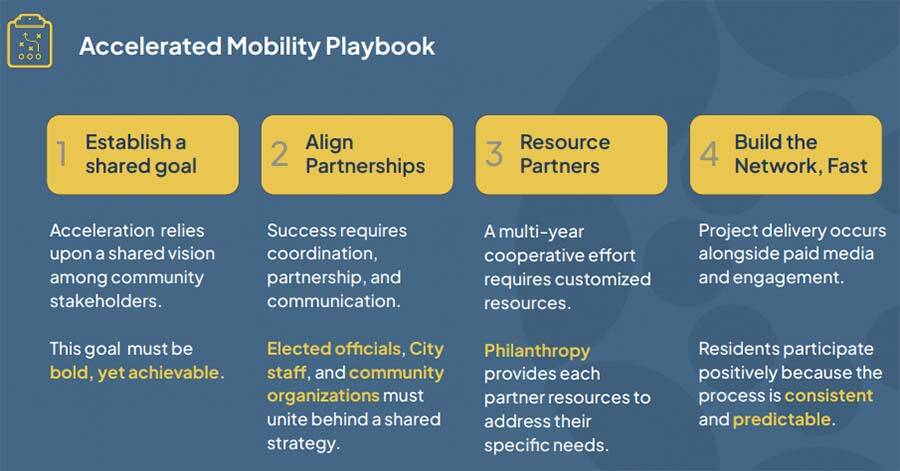Bainbridge Island wants more people to ride bicycles, for a number of reasons. But its Sustainable Transportation Plan focuses too much on current riders.
That was a conclusion made by the nonprofit City Thread, which developed an Accelerated Mobility Playbook for BI. The playbook also says while there are community groups that support STP poor communication stifles broader support.
On the positive side, City Thread says BI has the strategy in place with the STP and the right people in the Public Works Department for the project to be successful.
The BI City Council has a full plate on its agenda Sept. 12 after taking a number of meetings off the past six weeks for various reasons.
City Thread has helped five cities construct 335 miles of new bikeways in two years. Its PowerPoint presentation says mobility helps with population growth, traffic congestion, housing affordability, climate change, job access, street safety, air quality and public health.
To be successful projects must have a shared goal with buy-in from all stakeholders. Trust must be built among partners. Partnerships must be aligned among elected leaders, city staff and residents. Communication campaigns must build support. Partners must promote the project. Public engagement, planning, design and construction activities must be identified. And networking must be built quickly while interest is high.
Also at the meeting, actions will be recommended related to solid waste management. A matrix has been developed listing opportunities and constraints concerning environmental, financial, social, regulatory compliance and planning goals, and level of service in 16 areas.
Those areas are: Mandatory 3-stream waste collection; construction and demolition ordinance; contamination enforcement; solid waste management planning; waste audits; community partnership; public outreach and education; congregated waste receptacle space; edible food recovery; food donation tracking; household hazardous waste and e-waste program enhancement; narrow streets collection; reuse business support; Washington Utility and Transportation Commission rate-setting and regulation; city-owned and operated; contract collection service with city rate-setting control; and contract collection service with WUTC control over rates and billings.
Meanwhile, the council also will take another look at an affordable housing development in Pleasant Beach Village. A proposal in May was impacted by a moratorium on inns that also will be discussed at this meeting. Developers would create eight multifamily dwellings of 400 square feet each that would remain affordable for the workforce for at least 50 years, along with 10 market-rate units of 1,600 square feet each.
The council also would consider ending the moratorium based on updated regulations. An inn is defined as a building or group of buildings containing up to 15 guest rooms. Updated regs would limit the number of inns to three in Lynwood Center and two each in Rolling Bay and Island Center. It would prohibit inns on adjacent properties. And it would require that inns in Neighborhood Centers be owned and operated separately. If approved, the draft law would go to the Planning Commission for a public hearing and recommendation for the council.
The council again will also look at updates for its waste reduction ordinance. The main change would be removing a 25-cent disposable cup fee but would also create an annual list of home compostable disposable food service ware. Items would need to be available from at least two manufacturers, cost 15% or less more than comparison products and meet Ecology leak/grease resistant standards. It would also eliminate the need to request disposable products, adds an exemption for items used to wrap hot foods and adds language to make reasonable accommodations for people with disabilities. Cups and single-use products no longer would have to be requested or hidden from view. Next steps include business outreach, council review and public education.
Other items on the agenda include: Appoint members to the Lodging Tax Advisory Committee and Cultural Funding Advisory Task Force; and remove historic Suyematsu Farmstead from the lease with Friends of the Farm. In the consent agenda, the council will consider public hearings for the budget and tax levy; and name James E. Haney as city attorney.



